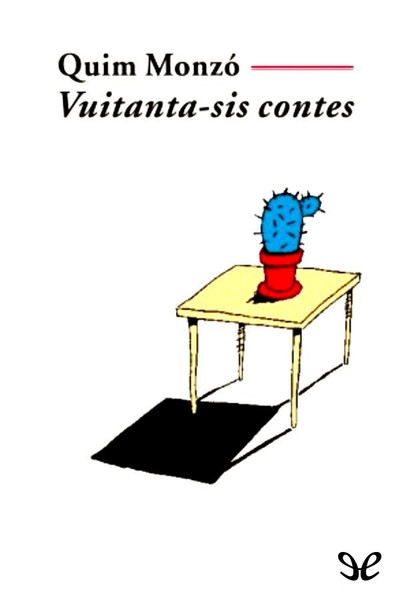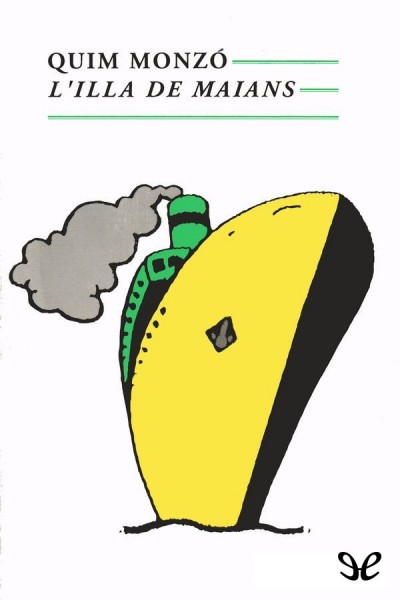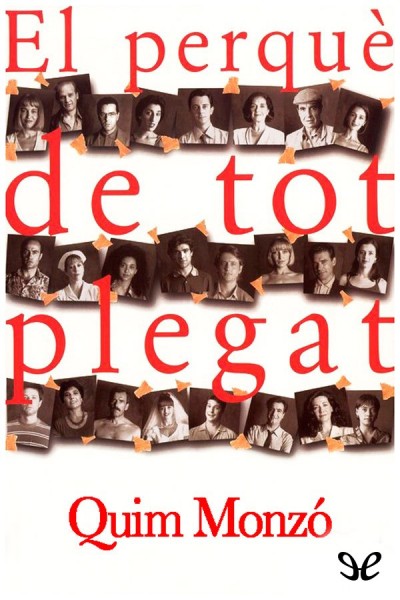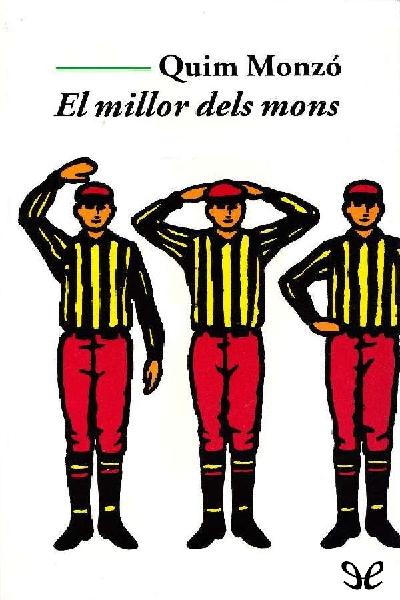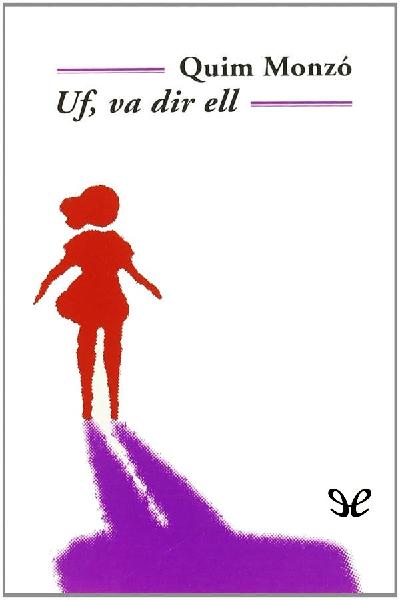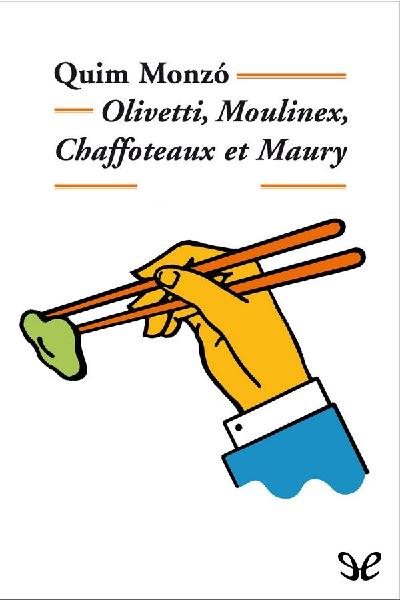oleebook.com
Mil cretins de Quim Monzó
de Quim Monzó - Género: Drama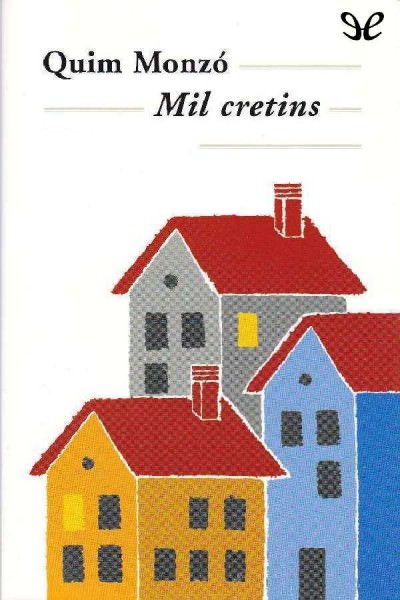
Sinopsis
Mil cretins és una obra que reuneix dinou contes de lescriptor barceloní Quim Monzó. Està estructurada en dues parts, amb relats més llargs a la primera i més breus a la segona. La primera naplega set: El senyor Beneset, Lamor és etern, Dissabte, Dos somnis, Miro per la finestra, La lloança i Larribada de la primavera. La segona ninclou dotze: La sang del mes que ve, Trenta línies, Un tall, Una nit, Una altra nit, Enllà de la nafra, Per molts anys, Qualsevol temps passat, La plenitud de lestiu, El noi i la dona, La forquilla i Xiatsu.
Va ser publicada lany 2007. El 2008 va guanyar el Premi Maria Àngels Anglada. Ha estat traduïda a diferents llengües, com langlesa, lalemanya, la francesa, la italiana i lespanyola.
Monzó passa comptes amb el dolor, la vellesa, la mort i lamor. Valent i sense concessions, mira a la cara el difícil equilibri entre vida i misèria humana.
Descargar
Descargar Mil cretins ePub GratisLibros Recomendados - Relacionados
Reseñas Varias sobre este libro
open letter has given me another book by quim monzo!
which i d somewhat less than the first one.
i loved the second half of this book, which showcases short-short stories, the longest of which is three-and-a-half pages. the first half has some standouts, to be sure, but some of them just didn't do anything for me, sad to say. love is eternal, saturday, and praise were great. they cover such topics as romantic entanglements built on misguided altruistic intentions, the inability to eradicate the stains other people leave on our lives, and the end results of our empty promises. and all three of them are superb. but the opening story, mr. beneset, is one of those short stories that i just don't "get." not that i don't understand the words, or the plot; i am not myself one of the thousand morons, it's just a story that i read, shrugged, and said "why was that story necessary?" which is how i used to feel about most short stories, until i came around, so it is an uncomfortable regression.
but then i get to the second half, and this story, thirty lines, and i have to laugh at the way he seemed to know what i was thinking, questioning the usefulness of the short story itself:
The writer begins typing cautiously. He has a short story to write. Recently, people have been talking about the virtues of short fiction, but, if he were to be frank, he would confess that he detests stories in general and short ones in particular. Nonetheless, to keep in the swim, he has been forced to join the band of fakers pretending to be passionate about brevity. Consequently, he is terrified by how lightly his fingers run across the keys, one word flowing after another, and another, and then another, finally shaping into a line behind which anotherand another!are already forming, yet still he can't focus on a theme, because he is trained for long distances: he sometimes needs a hundred pages before he gets a glimpse of what he is going to write about, and at others not even two hundred suffice. He has never once worried about length. The longer, the better: blessed be each new line, because, one after the other, they reveal the size and splendor of his work, and consequently, even though two or fifty lines add nothing to the story he is telling, at the end of the day, he never axes a single one. Conversely, to write this story he would almost need to take a tape measure and measure it. It is absurd. It's asking a marathon runner to run a hundred meters with dignity. In a story, each new line isn't one more line, but one less, and in this case, specifically, one line less up to thirty, because the rubric is: "between one and thirty lines," in the voice of the old fellow who called him from a newspaper's Sunday supplement to ask him for a story. The writer reluctantly lifts his fingers off the keys and counts the lines he has written so far: twenty-three. He has only seven to go to reach thirty. But, after he has registered that insightplus this oneeven less remain: six. Good God! He is incapable of having a thought and not typing it, so each new one eats up a new line and that means by line twenty-six he realizes he is only four lines from the end and he hasn't succeeded in focusing on the story, perhaps becauseand he has suspected this for a long timehe has nothing to say, and although he usually manages to hide the fact by dint of writing pages and yet more pages, this damned short story makes it quite clear, and explains why he sighs when he reaches line twenty-nine and, with a not entirely justified feeling of failure, puts the final full-stop on the thirtieth.
because it manages to simultaneously poke fun at people who think it is easy to write a short story, and at,you know, those overinflated windbags who write huge volumes of inflated postmodernist prose.
IS LIGHTHEARTED RIBBING, FRIENDS!!
so, yeah. i think the shorter pieces on this collection are stronger than the slightly longer ones on the first half, but he is unquestionably a writer i enjoy, and i also do strongly recommend the first collection open letter put out of his, Guadalajara. you know, if you stories.
also: heh. quim
come to my blog!girls-gone-wild hey-shorty not-a-polyglot51 s Shiva6 5
????? ???? ???? ?? ???? ?????? ??? ????? ????? ??? ??? ?? ???? ?? ?????? ? ???? ?????? ?? ?????? ????????? ????? ? ?? ?????? ???? ??? ?? ???? ??? ???? ? ?????? ?????? ???? ? ???????? ?? ?? ???? "??? ?????? ?????" ?? ????? ?????.
???? ???????? ?? ????? ??????? ????? ??? ?? ?? ?? ??? ????? ??? ???. ???????? ??????? ???????? ??? ???? ???? ?????? ???????? ????????? ?????? ???????? ???????? ?... ?? ?? ?????????. ????????? ?? ??????? ?????? ??? ??? ? ??? ????? ????? ??? ? ??? ????? ?? ???? ? ????.15 s Sepehr Omidvaar50 21
"?????? ???????"
?? ????? ??? ??? ????? ??? ??????? ?? ??? ??? ?? ??????.
"??????? ????" ????????? ?? ?????????? ?????? ??? ?? ????? ?? ?? ?????? ????? ???? ?? ?????? ? ???????????? ?????? ???. ??? ????? ?????? ?? ?????? ?????? ???? ???? ?? ????? ?? ????? ????? ?????????? ?? ???? ??????? ????? ?? ????? ??????? ?????????? ?? ???? ??? ?? ?????? ????? ?? ?? ??? ??????? ???? ?? ?? ????? ??? ? ????? ????? ???????? ???? ?? ???? ???? ??? ?? ??????? ???? ?????? ? ?????? ??? ????? ?? ?????? ???? ??? ??? ? ?? ????? ?? ???.
?????? ??? ? ????? ??? ??????? ??? ???????????????? ???. ?? ?? ??? ?????????? ????? ??????? ??????????? ???????????? ????????? ? ????????? ??????????? ??????? ??????? ????? ??? ??? ?? ??? ?????? ??????? ?? ????? ??? ???????? ????? ? ?? ????? ????? ??????????? ???????? ?? ???? ?? ?? ????? ??? ? ???????? ???? ? ??????? ???? ??????.
????? ????????????? ? ?? ??? ?????? ???? ?????? ??? ???? ?? ???? ??? ????? ????? ??? ?? ????????? ?? ???? ??? ???????:
https://shorturl.at/fhrN39 s2 comments Jonfaith1,961 1,597
Despite the charming Barcelona locale, this was an indifferent collection of stories, many which wrestle with the zentih of life: love and mortality share top billing with guilt. Most of the stories are undercooked, more sketches than even glimpses. I felt those stories concerning authors and writing were particularly obnoxious.
Microstories apparently don't suit me.5 s Vilis639 110
Munzo labi prot aiznest ?ietami vienk?rus gad?jumus kosmisk? absurd?, ta?u eit tie p?r?k biei beig?s vienalga l?dzin?s burk?oai parodijai.4 s Andreua84 19
Quan vam entrar al reread, els amics de la universitat em van mirar sorpresos, fins i tot decebuts per veure com, de tots els autors de la literatura universal, de tots els escriptors amb fotografies en blanc i negre, fumant i mirant per la finestra o simulant que rumien un conte que mai veurà la llum i que existeix com a pretext d'una fotografia, sempre em dirigeixo a la M (més tard a la P, per Pàmies i després a la C de Cortazar i la B de Borges) per buscar aquests llibrets curts que devoro moltes tardes (alguns ja llegits) quan verdaderament no sé què em passa, i que em reconforten tant.
Potser és per la visió tan quotidiana, per la ironia despresa de la mirada realista-pessimista d'un escriptor amb amor per Barcelona o potser per l'addicció a aquella pell de gallina que em sobresalta en finalitzar un relat. Quim Monzó m'entendreix. Em fa veure que en aquella senyora que baixa per dos croissants de xocolata al forn de la cantonada perquè avui, dilluns, els seus néts tenen entrenament de futbol; hi ha una història. Que també hi és en aquell home que renta els plats, escoltant com la seva dona parla de la necessitat de comprar un nou estampat per les cortines, però que ell ara, amb la forquilla, intenta treure allò que embussa la pica com ho feia el seu pare, que ara es mor en una clínica privada que li treu la meitat del sou. Tots al final som històries i ens ajuda escoltar les dels altres per no haver d'enfrontar-nos a les nostres, que ja ens les sabem de memòria i tendeixen a ser les més mal escrites (eh, però igual de divertides i iròniques).
Centrant-me en el llibre, he de dir que hi ha dues parts diferenciades (dividides pel mateix Monzó) i que, sense cap mena de dubte, la primera és molt millor que la segona. Amb això no dic que els relats de la segona meitat no estiguin bé (n'hi ha molts que els gaudeixes amb enveja) però és que els primers són, mare de Déu, sublim darrere sublim. El llibre descriu la decadència humana des de tots els prismes de l'edat: els problemes de fer-se gran, d'estimar quan no s'estima, de la solitud de la companyia, o de la mort, individual o col·lectiva, d'una part o de la totalitat del "jo". Temes transcendents que a partir de l'estructura del relat (que sabeu que m'és predilecte) es configuren a la perfecció.
Aquí (on escric aquestes últimes paraules) hi anava un altre paràgrafs (esborrat després de rumiar-m'ho). No era res important i, potser per això, he decidit esborrar-lo i substituir-lo per aquestes paraules que tothom estarà d'acord: molesten més que cap altra cosa.4 s Navid33 10
????????? ?? ?????????? ????? ?? ??????? ????????? ?? ?????? ?? ????? ??? ??????? ??? ??? ????? ????? ???..
?????????? ???? ??? ???? ?? ???? ? ???? ????? ?????. ??????????????? ???? ??:
- ??? ??? ???
- ???
- ????? ??????????
?????????? ???? ??? ??? ??????? ? ??????????. ????????? ???? ??:
- ??? ??????? ???
- ????
- ???????? ????
?? ??? ???? ?????? «???????? ????» ?? ????? ??????? ??-?-??? ???? ? ?? ???? ??????/????????? ? ?? ??? ??? ???????? ?????? ??? ??? ????? ????.fiction short-stories4 s Aina Pocurull26 3
el conte una nit descriu literalment una violació i no sé si lautor nera conscient mentre ho escrivia; si es pretén que hi hagi humor fa força angúnia. si que és cert que hi ha històries divertides i jugar amb el surrealisme és xulu, però no ho sé, sap greu quim.4 s Hollowspine1,438 35
Many of these stories, I thought, were pure genius. Monzo really brings out the truth of ridiculous situations, absurd realities, silly assumptions and the thousand moronic things that people do all the time.
One of my favorites in the collection was Praise, about a famous author who makes an off-handed comment about a good book he'd read, creating celebrity around a new writer. It made me laugh and was completely accurate about the world of publicity and public opinion.
The first section of the book was composed of longer works, ranging from around 7-10 pages long. The second part was flash fiction, some stories only a paragraph or two long. Throughout I was astounded by Monzo's ability to write a complete story, moving, funny, and a perfect bite of life from just one and a half-pages.
Many of the stories take place in the obsessive minds of their narrators, going over the options, what they want to do, what they should do, what others may think, and on, that is completely natural to me and reminded me of some of my own moronic inner monologues.
I was also especially taken by the story Saturday, which had so many levels to it and was a suspenseful story despite the lack of excitement in it. I kept wondering about the motives and trying to figure out what happened, death or abandonment, only at the end did I partially satisfy my curiosity. The story builds until the end, which was a very interesting ending.
The collection is very well-written (and translated) and every word seems specifically chosen for it's effect. The end result is a wonderful read that will stick with readers well after the last word is read.3 s Biblio Bat4 7
?????????? ??? ??????? ???? ???? ? ????? ?? ??? ?? ???? ? ?????????? ?? ?? ? ????? ?????????? ?? ??? ?? ?? ??? ?? ???? ?????? ???? ??? ????? ???? ?? ??? ????? ????? ??? ???? ????????? ?? ?? ???? ?????? ???????? ???? ?????? ????? ???????? ??????? ? ?? ???? ?? ?? ???? ?? ????? ?? ?????? ??? ???? ?? ???? ?????? ? ?????? ?? ?????? ?????????? ??????. ??? ??????? ????? ????????? ???? ? ?????? ???? ??? ?????.
? ??????? ?? ?? ???????? ????? ?????? ??? ?????? ????? ?? ????? ?? ??? ???? ???? ???.2 s David Zúñiga Artigas40 1 follower
Relats de temes més profunds com la mort o la sollitud i altres sobre l estupidessa humana i els petits sense sentits de la vida. Molt bó.2 s Farshad Ashourun3
?? ????? ???? ?? ?????? ???? ??? ? ???? ???? ???? ?? ?? ??? ????.
??? ?? ??? ?????? ???????? ???? ?? ????? ????.
?????? ?????? ???? ???2 s Story882 3
3.5 stars. Satisfying stories, short and biting.books-in-translation european-lit short-stories2 s jeremy1,152 273
a thousand morons (mil cretins) is the third collection of short stories by catalan author, journalist, and translator quim monzó to appear in english translation. split into two sections, a thousand morons features (in addition to a most fantastic title) nineteen well-crafted stories, many of which are no longer than a couple of pages. introducing brio into the banal and fun into the funereal, monzó is able to make an intriguing tale of even the most commonplace incidents or interactions. his often melancholy characters, possessed as they sometimes are by ruminative personalities, endure the vagaries of everyday life with reluctance and resignation. while his stories on their face may appear uncomplicated, they frequently belie the simplicity and straightforwardness of life's more prosaic moments. "i'm looking out of the window," "praise," and "the coming of spring" are amongst the strongest of the collection's longer stories and "a cut," "one night," "another night," and "beyond the sore" are the best of the briefer ones. a thousand morons is further proof that quim monzó is one of the more proficient, distinctive, and exciting writers at work today.
hang up, if you want, i don't care, because the only thing i'm interested in now is looking out of the window and shutting myself off from the rest of the universe. all this time i've been looking out of the window, i've not thought about work, the family, or any of the problems that keep me awake at night. i've not thought, say, about the life i normally lead, or about how i spend my day pondering how things should be rather than savoring them as they come along. i do all i can to put reality in the right frame and to foresee everything so that, if i can avoid any surprises, tomorrow will be all the more tolerable. but foreseeing everything creates such boundless disquiet that things pass me by a breath of air and i enjoy nothing. i only enjoy a kiss when it is over and done with; then i remember it with pleasure. i don't enjoy it at the time because, beyond the tenderness, i see the darkness, the horrific possibilities lurking behind all that is pleasant.
*translated from the catalan by peter bush (guadalajara, the enormity of the tragedy, onetti, goytisolo, et al.)fiction shortstories translation2 s Daniel723 50
I love Monzo's prose and perspective on the world. Some of these vignettes read short meditations, some as a single scene that Monzo observed, whether in actuality or in his own head. The longer works that make the first half of this story allow for more emotional attachment, even if a story doesn't particularly go anywhere. In fact, the more I read of Monzo, the more I appreciate his prose as a source of reading enjoyment. I adore the written word and I feel a mutual sense of adoration in Monzo's words. There is genuine love of language and story in these stories, and it is wonderful to encounter this sentiment.2 s Núria530 636
Monzó mai em decepciona. És sempre divertit i lúcid, però cada vegada més dur. Prefereixo els contes de la primera part, que els de la segona, que més aviat són només anècdotes, tot i que són molt enginyoses. És sorprenent la capacitat que té per resultar sempre realista, tot i que moltes vegades els seus contes acabin amb exageracions grotesques, però és que aquestes sempre resulten totalment creïbles i lògiques. 'L'arribada de la primavera' és una obra mestra, tan ben escrita, tan absorbent i tan reconeixible. 2007 5-favoritos cuentos ...more2 s Maria Di Biase314 74
Lettura molto strana.
Un racconto, Sabato è molto valido. Bello. Ma tanto.
Qui altri racconti però sono una noia mortale.
Altri passano più tranquillamente, ma niente rimane.
Sono rimasta molto delusa da questo libro. Vero è che nelle raccolte c'è sempre quella parte che piace di più e quella che colpisce meno. Ma un solo racconto non può reggere il valore di un intero libro. Almeno per me.racconti2 s Beth Wheeler31 12
A quick, more than enjoyable read. What a short story craftsman: Monzo writes with perfect pacing, delightfully absurd characters, and endings that surprise and satisfy. 2 s MohammadHosein40 11
???? ??? ???? ??????? ?? ???? ?????? ?????? ??????? ?? ??? ????? ???? ??????? ??? ?? ?? ??? ??????? ????.2 s Maria Ivars78 3
[2.5]
Tenia moltíssimes ganes de llegir aquest recull de relats i, tot i que no he pogut gaudir-lo tant com m'agradaria per falta de temps, he de dir que crec que Quim va encertar a l'hora d'elegir els temes a tractar. No obstant, no m'ha acabat de convèncer l'estructura del llibre; em donava la sensació que mai acabava de saber el que deuria sobre cada relat. Això sí, totes les històries són accessibles per a tothom i entretingudes!1 Mahtab Hamzehlouy11 2
??? ??????? ???? ??? ?? ?? ????? ???? ???????? ? ????? ?? ?? ????? ???? ???????? ?? ?????? ??????.
?? ??? ???? ??? ????? ?? ???? ???????? ?????.
?? ??? ?? ?????????? ???? ?? ?? ?????? ??? ??????? ????? ???? ?????.
??????? ?????? ???????.1 Alec Downie287 7
An oddity of observation.2024-to-read-list1 Tara85 27
A good short story collection can grow a city. Either organically as when an author writes stories and publishes them together once he has enough for a book ( F. Scott Fitzgerald, Ernest Hemingway, or Salinger are good examples). Or through careful planning from the get/go think James Joyce, Jennifer Egan and William Faulkner. Obviously the critical thing is that the stories, themselves, are good. But a planned collection adds a layer of complexity for the reader. The stories can be linked or not. They can be built around a group of shared characters, set in the same historical period or geographic region. The more ambitious the author the more abstract the themes held in common become.
And then there is Quim Monzó. Whose short story collections appear so meticulously planned, but whose individual stories manage to still feel spontaneous and dashing. His new collection, a thousand morons, is exactly what it claims to be. A collection of portraits mostly sketches of morons. Men & women from all walks of life behaving idiotically. But these absurdities, these quirks of behavior and situation, are completely familiar. The moron in the title is all-encompassing. The situations are simultaneously tragic and very funny. Monzó explores the absurdity of the human condition while avoiding the obvious literary contrivances that go with it.
A young man visits his father, Mr. Beneset, in a nursing home. Their conversation is nothing special. But as they speak the father is donning lipstick, stockings, a bra and a dress. This quirk, the component that unbalances us, moves the story away from the mundane and towards the sublime.
In Love is Eternal another young man bumps into an old girlfriend. They rekindle their half-hearted romance. When he learns she is dying he decides to make her remaining days happy, only to have the situation backfire on him completely.
In Praise a simple comment by a best-selling author, a sentence of praise for a debut collection of short stories, creates a domino cascade of expectations and obligations that traps the protagonist in a farce. Praise is a prime example of how Monzó writes comedy with an underlying somberness the impression he gives is that though these situations are silly and ridiculous to the reader, they are serious matters for his characters.
a thousand morons is divided into two parts. Part 1 contains seven short stories of approximately 10 pages in length. In Part 2 the stories are more numerous but even shorter, about 3 pages or less. They are more sketches or flash fictions than traditional short stories. Monzó has truncated the narrative arc, moving quickly from beginning to end with very little detail wasted between. The stories in Part 2 are snappy. Joke punchline: the annunciation goes differently than expected, a mother watches as technology disconnects her family, we witness an inane pick-up at a cocktail party and a hostile restaurant takeover. Its all situational irony, carefully planned and brilliantly entertaining.
It is the second collection of Quim Monzó s short stories, translated by Peter Bush, to be published by Open Letter. The first, Guadalajara, was cerebral and written in a dense prose. In it Monzó played complex games with his description of space, interpretation of other authors works and with words. a thousand morons is very different. Hes left the literary games behind and simply held up a mirror. The reader will easily recognize his- or herself in these stories. There is nothing technically breathtaking in the writing, per se, other than its economy (which, actually, is rather breathtaking). He deftly s0metimes brutally) depicts the emotions and eccentricities which lead his characters into the situations he is describing. According to Quim Monzó, human beings write their own farces and (in the spirit of Sartre) create their own hells. We star in our very own comedies every day without the slightest awareness that were doing so.
For my full review please visit my blog at http://booksexyreview.com/2013/01/09/...galley-review-copy paperback personal-library ...more1 Darryl411 1 follower
Quim Monzó is one of the most highly regarded contemporary Catalan authors, who has only recently been recognized in the English speaking world thanks in large part to Open Letter Books, which has published three of his books in translation in the past three years, Gasoline, Guadalajara, and A Thousand Morons. Although he has written several novels, articles and essays, he is best known in Spain and Europe for his short stories, which are generally surreal and comedic works filled with identifiable characters who find themselves in absurd situations, largely of their own doing.
A Thousand Morons, originally published in 2007, is the latest collection of short stories by Monzó to be translated into English. The first portion of the book consists of longer works, such as "Mr. Beneset", in which a man visits his somewhat unorthodox father in an old people's home, and "Love Is Eternal", about a man who decides to marry his apparently dying girlfriend, whereas most of the stories in the second part are less than five pages in length, including "Next Month's Blood", where the archangel Gabriel receives a surprise when he tells Mary that God has decided to bless her with a son, and "A Cut", in which a boy with a large neck wound is upbraided by his teacher for interrupting class and spilling blood on the floor.
Monzó excels in portraying an ordinary character in a everyday situation that slowly unfolds into a wickedly surreal one. My favorite was "Saturday", a story about a woman who progressively gets rid of everything was owned by and reminds her of her former husband, but then goes just a bit overboard in the process.
I thoroughly enjoyed this short story collection, and I look forward to reading the other three books by Monzó that I already own.1 Charles Dee Mitchell854 64
Chad Post, publisher of Open Letter Editions, reports that when he met Quim Monzo, the Catalan author of A Thousand Morons, at a PEN World Voices conference, the writer asked him whether he really wanted to publish a book with so many sad people in it.
There are many sad people here, but they are not people you want to avoid, at least on the page. Monzo is sixty years old and mortality is much on his narrator's and main character's minds. Not their own, so much, as those of aging parents. There are many visits to assisted living facilities in these few pages, and to hospitals, and to suddenly empty apartments. Situations are minutely observed and there is no shying away from pain and awkwardness,
"Mr. Beneset," the first story in the collection sets a tone that carries throughout the collection. A man visits his cross-dressing father in an assisted living facility. They chat. The son helps his father with his bra. Once his father is dressed and has put on his face, they go to sit in the garden. In the car before he drives away, the son removes the lipstick trace of his father's farewell kiss from his cheek.
Monzo's book makes for an enjoyable, melancholy afternoon read.contemporary-lit1 Peter McCambridgeAuthor 19 books52
I've been thinking long and hard about why I loved this book so much. For a start, I really finished it weeks ago, but left myself a few of the really short stories at the end of it, just to drag out the experience a little longer. Now that it's finished, I want to start over again.
I think it's the voice that really won me over, rather than the themes that most of the I've read seem to focus on. There is something unique and truly special about the writing. The language is simple, matter of fact, and this makes it all the more curious when things don't quite add up, when each story is off just enough for it to stay with us long after we have finished reading it. (A man's parents, for example, are "on life's final slope". Perhaps this is an everyday expression in Catalan - in which case, it comes over perfectly - or perhaps it's just a really lovely choice of words, but either way nice, simple touches these add up throughout any book, leaving us with the impression of something a little extraordinary.)
I really d Guadalajara by Quim Monzó, too, and now I'm off in search of anything else of Monzó's and translator Peter Bush's that I can get my hands on.1 RH Walters805 13
These stories are so weird it's having cranial sacral therapy. I love the minute phenomena he describes, the mounting awkwardness that turns into a vendetta from not making a promised phonecall, to the bullying that results when a group tries to commandeer tables at a cafe. Also, of course, the deep plain sadness of a grown child dealing with parents who have become needy children. This writer has truly blocked everything else out and honed in on his own voice. An unusual and enlivening perfume. 1 Raro de Concurso521 2
Libro de cuentos que tan bien se le da al Sr.Monzó. No a la altura de otros volúmenes, pero que se deja leer con gusto y como no, con cierta inquietud y desasosiego.
Algunos son como una canción de Astrud novelada y otros, como el príncipe azul frente a la bella durmiente que no se despierta ni abusando de ella, me recuerda mucho a los cuentos de "Guadalajara".
Hay de todo, como digo, pero desde luego no deja indiferente.1 Javi BóinezAuthor 1 book78
Solo por «La alabanza» y «La llegada de la primavera» ya valdría la pena su lectura, pero es que el resto de relatos son más que notables.
Monzó trata el amor, el desamor, la vejez, la muerte y, en resumen, la vida, de manera magistral.relatos1 Brad208 23
Autor del comentario:
=================================


